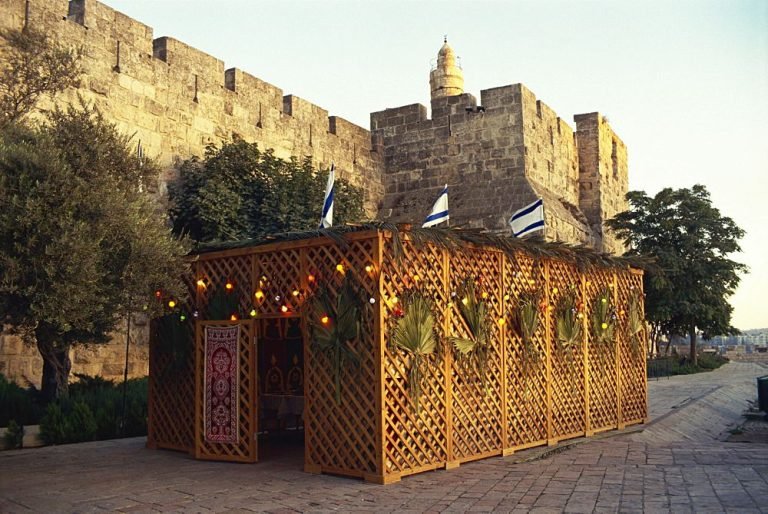31 August 2023 (Evening)-Chag HaSukkot Aleph!
Chag HaSukkot (the Feast of Tabernacles) begins this evening, 31 August 2023, which is the evening beginning the 15th day of the 7th Hebrew month. 31 August (evening) through 1 September (evening) is Chag HaSukkot Aleph (the 1st day of the Feast of Tabernacles).
Significance:
In the ancient Hebrew wedding ceremony, Chag HaSukkot represents the wedding week. In Western culture, this is often thought of as the ‘honeymoon’ period. It is when the consummation takes place and the husband and bride officially come to dwell together as one united body. (When Yeshua and His bride are officially united and the bride finally gets to dwell with her Husband and King, forever!) During Sukkot, we are testifying to the all nations that we wait upon Yahweh to fulfill His promise to bring us back home again, both physically to the land of Israel and spiritually at Yeshua’s return.
No Servile Work:
Yahweh commands us to do no servile work (work for pay, chores, etc.) on Sukkot Aleph (the First Day of Tabernacles) and on Shemini Atzeret (the 8th Great Day). This is a time of celebrating our wedding with our King, Yeshua! Building our sukkah is permitted on the first day.
Building our sukkah:
We build (and decorate) our sukkah (tabernacle) on the afternoon of the first day of Sukkot, at evening. (The afternoon of 1 September.) Then we dwell in our sukkah for the whole [wedding] week, until the afternoon of Shemini Atzeret (when symbolically, the Husband and bride [Yeshua and us] pack up and head home to begin life together.) As we explain in “SukKot: The Feast of Tabernacles”, a tent is not the same as an authentic sukkah. However, in the dispersion, where building an authentic sukkah is not always possible for everyone, many will set up tents outdoors for the week. The point to remember is that we are dwelling with Yahweh (trusting in His protection and provision).
Decorations:
Throughout the Babylonian year, many people decorate for Babylonian traditions, such as Christmas, Easter, Halloween, etc. These Babylonian traditions are pagan traditions, in honor of ‘elohim of the nations’. Yahweh our Elohim tells us to not take part in such traditions and to worship Him only in the way that He commands us. Sukkot involves decorations that Yahweh chooses! And these decorations are in honor and thanks to Yahweh, for all of the provisions He has given us throughout the year (harvest season). Once again, many of us live in the dispersion, and may not have all of these specific decorations accessible to us. But we should try to follow Yahweh’s commandments to the best of our ability. After all, it is Yeshua’s wedding!
And His Father gets to choose the wedding decor! According to Vayiqra (Leviticus) 23:40, we are to decorate our sukkah with:
- The fruit of beautiful trees
- Branches of palm trees,
- Boughs of leafy trees,
- Willows of the brook.
Vayiqra (Leviticus) 23:39-40
39 “Also on the fifteenth day of the seventh month, when you have gathered in the fruit of the land, you shall keep the feast of Yahweh for seven days; on the first day there shall be a Sabbath-rest, and on the eighth day a Sabbath-rest.
40 And you shall take for yourselves on the first day the fruit of beautiful trees, branches of palm trees, the boughs of leafy trees, and willows of the brook; and you shall rejoice before Yahweh your Elohim for seven days.”
Celebrating Yahweh’s Feasts:
Like all of Yahweh’s feasts, Sukkot is a time to reflect upon Yahweh’s word, to focus on Yeshua, and focus on being the type of Proverbs 31 bride that Yeshua will want to take home to His Father’s (Yahweh’s) house. Sukkot is also a time to teach our young ones the significance of Yahweh’s feasts. Like any wedding, Sukkot should be a time of joy and celebration, which our children will remember and eagerly await each year. Decorating the sukkah and camping outdoors for a week (if possible) should be a fun event, giving thanks to Yahweh for the provisions of the year.
Vayiqra (Leviticus) 23:41-43
41 “You shall keep it as a feast to Yahweh for seven days in the year. It shall be a statute forever in your generations. You shall celebrate it in the seventh month.
42 You shall dwell in sukkot for seven days. All who are native Israelites shall dwell in booths, [sukkot, tabernacles].
43 that your generations may know that I made the children of Israel dwell in booths when I brought them out of the land of Egypt: I am Yahweh your Elohim.”
Chag HaSukkot sameach!




